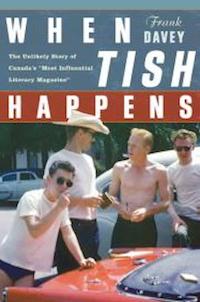
A kind friend who knows how much I enjoy memoirs written by poets sent me this book from Canada. It’s less a memoir than the autobiography of a magazine, you might say, the product of a certain development in postwar poetics that continues to interest me. Today in old age Frank Davey is one of Canada’s leading cultural figures, but back when this book begins he, like the other writers of the book, was growing up in the working class of western Canada. Many were the first generation in their families to get the chance at a college education, and Davey acknowledges that a liberal and inclusive social policy made the avant-garde they pioneered a possibility during this “moment” (roughly the late 1950s and the beginning of the 1960s).
How it fits in with the pipeline initiatives ramrodded through by Diefenbaker’s government remains obscure in this volume, but Davey is wonderful about what it was like to be young in British Columbia—young, and super smart, and hungry for everything. Compared to these Canadians, my own youth seems to me in retrospect a thing of jaded, blasé dissolution, our gods not writers per se but Syd Barrett and Abbey Lincoln and Carol Kaye and T.Rex and the David Bowie of Aladdin Sane and Diamond Dogs, “The door to dreams was closed, your park was real and dreamless.” Nowadays people forget about what an enormous impression the newsletter TISH made when it first starting appearing in the classrooms of UBC and then all over the world. Even the name of the thing, the more or less transparent anagram of “shit,” startled and appalled the righteous. In Canada people hadn’t seen anything like it, and sizable numbers of the movers and shakers panned it, particularly in the regions of Toronto, long thought to be the publishing and artistic center of the nation—what Davey calls “an Ontario-privileging Canada.” Who were these upstarts? They seemed to be pandering to the lowest common denominator of American achievement, the “open field” poets of Black Mountain and the Beat schools, those who had sneaked in to Canada under the guise of Donald Allen’s anthology of The New American Poetry, and through the person of the American scholar Warren Tallman, whose classes at UBC disseminated this nonsense pretty thoroughly, to both boys and girls. Young women were part of TISH too, like Gladys Hindmarch and Pauline Butling and Judith Copithorne snd others, but TISH’s editorial board was boys only, and you get pages and pages about their first cars and how souped up they were and how old the cars were. Why, the cover of the book has a photo of these young hombres at some sort of car wash scene or rally comparing their machines like the protagonists of Kenneth Anger’s Kustom Kar Kommandos—and baby, they look hot as hell, especially one young poet in his dad’s stretched-out T-shirt and his baby brother’s tight black speedo. —I e-mailed George Bowering to ask who that particular sex god was and he wrote back that it was Bob Hogg, (Robert Hogg on book covers).
TISH lasted for a few years, until internal squabbling wore them down, but also the sense that they had succeeded in their mission. Like other movements of the early 1960s it attained its own mythology, and Davey depends heavily on previous accounts by the principal players, even if his chief delight seems to be proving them wrong on this or that factual point. He also likes to jab the pretentious nitwits of the poetry world: “Robin Skelton gives a reading at Ivy’s Bookshop in Oak Bay. He’s the self-declared major poet in Victoria. He teaches at UVic, and tries to dress like a medieval Irish bard.” (Actually we should have a whole lot more Robin Skeltons around, and perhaps seventy per cent fewer iconoclasts.) There’s a lot of romance in the book: Fred Wah and Pauline Butling, George Bowering and several inanomoratas, Davey himself is mad about the young Daphne Buckle in college (the poet better known today as the great Daphne Marlatt), but winds up marrying a Helen and then a Linda McCartney. I was like, what?!?! But it was a different Linda McCartney than the one who captivated Paul, then the world, with her beautiful voice and her veggie TV dinners.
Davey went on to found the long-running Open Letter in 1965—still running, is it, after all these years! Wags called it Open Sewer. In later years the TISH poets were dismissed as “pro-American annexationists.” The book ends, pretty much, when George Bowering releases Baseball in January 1968, the end of an era, Davey acknowledges, for it is the “first extraordinary text I’ve seen one of us publish. The first that I’m sure will outlive us.” Oddly enough all the participants in the book are still alive, or at least the ones I could count. Their parents, some of their wives, their teachers like the Tallmans, the group of US poets who came to Vancouver in the early 60s and rocked their world (Creeley, Spicer, Mac Low, Olson, Duncan), all gone now, but the TISH group lives on and more power to them.

Poet, novelist, playwright, art critic, and scholar Kevin Killian earned a BA at Fordham University ...
Read Full Biography

